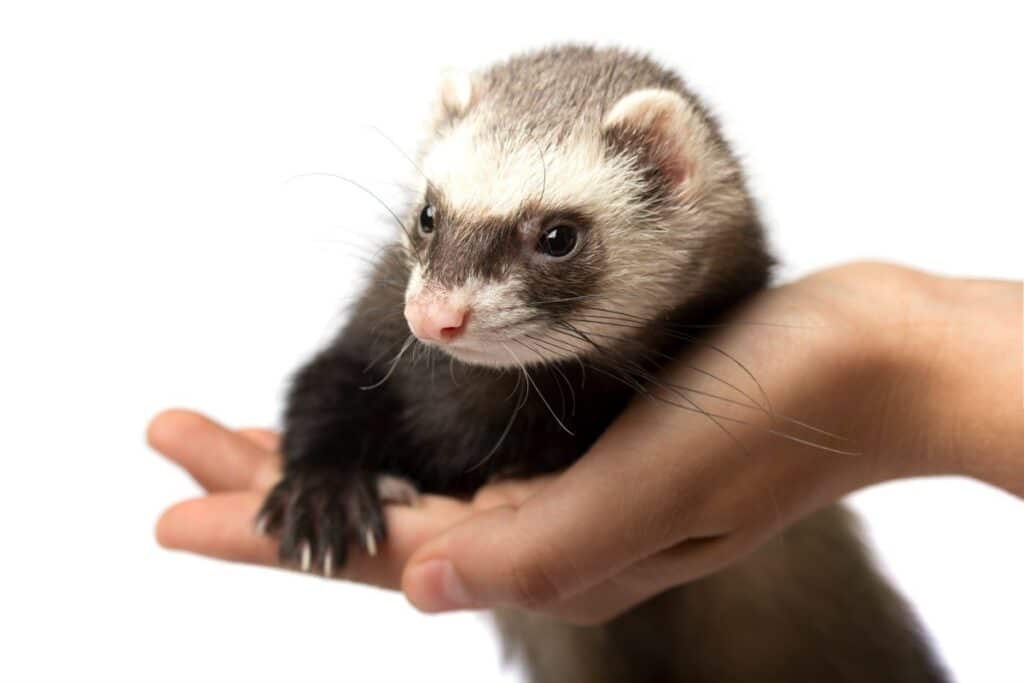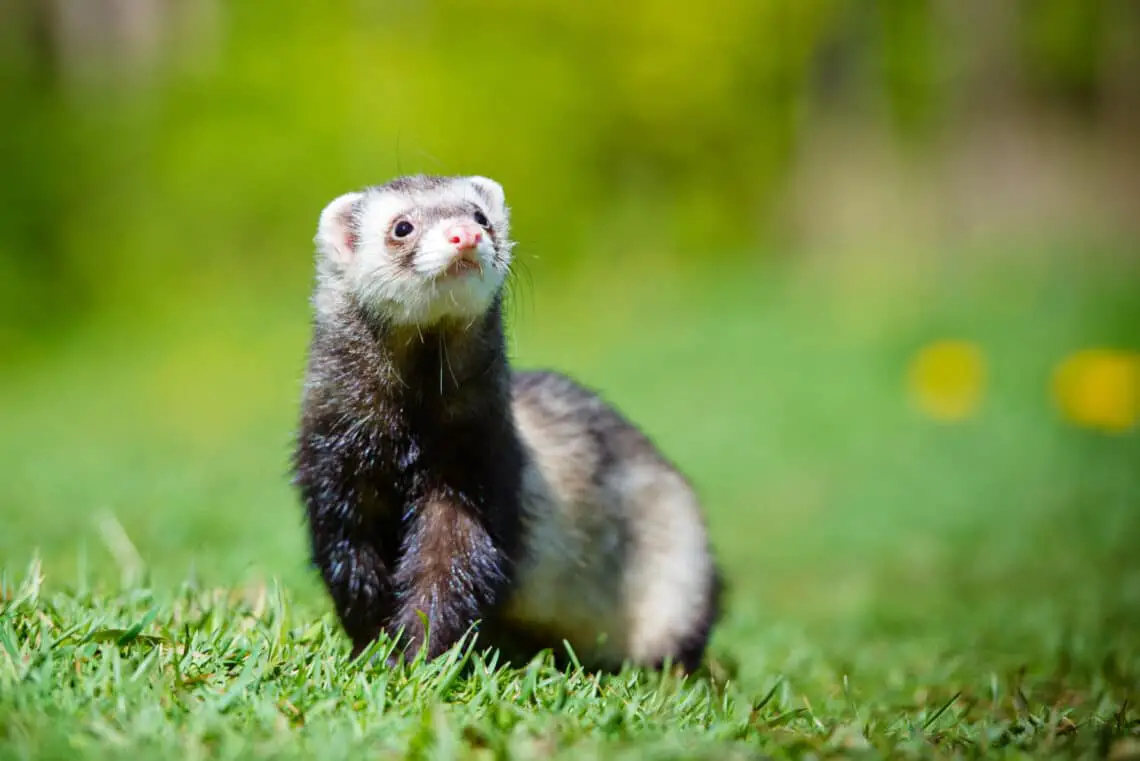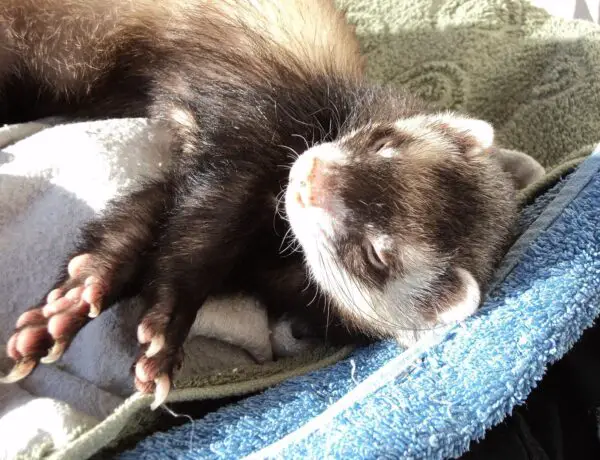Introduction
Is A Ferret A Good Pet: Ferrets are undeniably adorable, with their playful antics and inquisitive nature, but before you decide to welcome one into your home, it’s essential to explore the intricacies of ferret ownership. In this discussion, we will delve into the various aspects of ferrets smart care, their unique characteristics, and the responsibilities that come with being a ferret owner. By the end of this exploration, you’ll have a better understanding of whether a ferret is the right pet for you and your lifestyle. Ferrets have gained popularity as pets in recent years due to their charming personalities and endearing appearances. These small, carnivorous mammals are known for their boundless energy and curiosity, which can make them entertaining companions. However, the decision to make a ferret a part of your household should not be taken lightly. Like any pet, ferrets come with their own set of challenges and requirements that must be carefully considered.
We will take a closer look at the natural behaviors and characteristics of ferrets, such as their playful and mischievous nature, their intelligence, and their social needs. Ferrets need a secure and stimulating environment to thrive. We will discuss the type of housing, cage setup, and the importance of providing mental and physical stimulation. Ferrets have specific dietary needs, and a well-balanced diet is crucial for their health. We will explore what ferrets should eat and how to meet their nutritional requirements. Regular check-ups and vaccinations are essential to ensure your ferret’s well-being. We will touch on common health issues and the importance of finding a knowledgeable veterinarian. Some regions have restrictions or regulations regarding ferret ownership. We will discuss these legal aspects to ensure you can legally own a ferret in your area.
Ferrets are highly social creatures, and they thrive in the company of other ferrets or with human interaction. We will discuss the importance of having at least two ferrets to prevent loneliness and the need for daily playtime and interaction. By thoroughly examining these aspects of ferret ownership, you’ll have a comprehensive understanding of what it takes to be a responsible ferret owner. While ferrets can make fantastic pets for the right individuals or families, it’s crucial to be well-informed and prepared to provide them with a loving and stimulating environment. Ultimately, the decision of whether a ferret is a good pet for you depends on your willingness to meet their unique needs and integrate them into your lifestyle.

Are ferrets good for beginners?
Never get a ferret if you’re looking for an easy pet. But if you can rise to the challenge, a lot of people think it’s worth it. “They’re so interactive – they want to be with you. They’re so therapeutic and so entertaining,” says Lamb.
Ferrets are undeniably charming and endearing animals, known for their playful nature and unique personalities. As potential pets, they can be a source of joy and entertainment for individuals and families alike. However, the question of whether ferrets are suitable for beginners in the world of pet ownership is a crucial one that requires careful consideration.
While ferrets can make delightful pets for the right people, they may not be the best choice for everyone, especially those new to pet ownership. Beginners should carefully weigh the commitment, responsibilities, and unique needs associated with ferrets.
Ferret ownership can be a rewarding experience for those who are willing to invest time, effort, and love into these playful creatures. However, due to their training requirements, odor concerns, and potential health costs, they may be better suited for individuals or families with some prior experience in caring for pets.
Ultimately, the decision to bring a ferret into your home should be based on thorough research and an honest assessment of your lifestyle, readiness, and willingness to provide the care and attention these charming animals deserve. If you are up for the challenge and can meet their needs, ferrets can become cherished members of your family, offering years of laughter, love, and companionship.
Do ferrets smell?
The natural musky odor of ferrets comes from their scent glands (most notably the anal glands) and is used for territorial marking. Most commercially available ferrets in the United States are “de-scented,” which means that they have gone through a surgical procedure to remove their anal glands.
The unique scent associated with ferrets is primarily due to their musk glands, which are located near the base of their tails. These glands produce a musky secretion that serves several purposes in the wild, including marking territory and attracting mates. While domesticated ferrets have been bred to have a milder scent than their wild counterparts, the odor can still be noticeable, especially if their musk glands are not removed or altered through a surgical procedure called descenting.
Many ferrets undergo descenting, which involves the removal of the musk glands. This procedure is often performed when ferrets are young and can help reduce the intensity of their scent. It’s important to note that descenting is not a guarantee that your ferret will be completely odor-free.
Regularly clean your ferret’s cage and bedding to prevent the buildup of odor-causing bacteria. Use ferret-safe cleaning products and wash their bedding frequently.
A high-quality, appropriate diet can influence a ferret’s scent. Ensure your ferret is receiving a balanced diet of commercial ferret food, as well as fresh meat or high-quality cat food, which is closer to their natural diet.
Do pet ferrets love their owners?
While ferrets are not for everyone, they can make great pets for the right owner. They are affectionate and bond with their owners, quiet for a large part of the day, and there are few pets as playful as ferrets.
Social Creatures: Ferrets are inherently social animals. In the wild, they live in groups, and domesticated ferrets often view their human owners as part of their “pack.” They thrive on social interaction, and their bond with humans can be quite strong.
Affectionate Behavior: Ferrets display affection in various ways. They may lick, nibble, or gently nip their owners, which is often seen as a sign of affection and grooming behavior. They may also enjoy snuggling with their owners, seeking warmth and comfort.
Playful Interaction: Ferrets love to play and engage in games with their owners. This playful behavior is not only a form of entertainment but also a way for ferrets to bond with their human companions. They may “dance,” chase, and even hide things to engage in interactive play.
Stress and Anxiety: Ferrets are sensitive creatures, and they can become stressed or anxious when separated from their owners for extended periods. This attachment and reliance on human interaction indicate a strong bond.
Can we pet GREY wolf in India?
Indian Wolf
Wolves are not domesticated animals; they are still wild and dangerous and can’t be trusted as a pet. In India, they are the biggest threat to children. Though many people are interested in keeping them as pets, it is not safe.
Wild Nature: Grey wolves are apex predators and are naturally wild animals. They have complex social behaviors, specialized dietary needs, and instincts that make them unsuitable for life in a domestic setting.
Safety Concerns: Wolves have sharp teeth, powerful jaws, and strong instincts that can be triggered in certain situations. Even if raised from a young age, they can become unpredictable and potentially dangerous as they mature.
Legal Restrictions: Many countries, including India, have strict regulations and laws governing the ownership of exotic and wild animals. Owning a grey wolf as a pet is generally illegal due to the potential risks they pose to human safety and their conservation status.
Ethical Concerns: Keeping a wild animal as a pet is often considered unethical and inhumane. Wild animals have complex physical and psychological needs that are challenging to meet in captivity.
Do ferrets bite hard?
Nibbles and nips are often playful or accidental and usually do not leave a mark on the skin. The deliberate, hard bite, which typically results in a puncture wound, is a much more serious situation. A ferret might bite for many reasons, but most biting behavior falls under one of these two general headings.
Ferrets have a playful nature, and one of their ways of interacting with each other and with humans is through gentle nipping or mouthing. This behavior is typically not painful and is more of an exploratory and social gesture. It’s their way of testing and interacting with their environment, including their owners.
Like puppies and kittens, young ferrets go through a teething phase. During this time, they may bite more frequently and with a bit more force as they explore their new teeth and gums. Providing appropriate chew toys can help redirect this behavior.
In some cases, ferrets may bite when they feel threatened or cornered. This can be a defensive response, and the bites may be more forceful. It’s crucial to respect your ferret’s boundaries and avoid situations that make them feel scared or uncomfortable.
Socializing and training your ferret from a young age can help them understand acceptable behavior. Reward-based training methods can teach them not to bite hard and to interact gently with humans.
Are ferrets kid friendly?
It is recommended to avoid adopting a ferret if you have small children in the home. They are very fragile animals and can be easily injured if handled inappropriately or dropped. Like a cat, they love to nap and usually sleep up to 20 hours a day. When they are awake, however, they are very active and playful pets!
Ferrets are naturally playful and social animals, which can make them appealing companions for children who enjoy interactive and engaging pets. Ferrets often form strong bonds with their human family members, including children. They may enjoy cuddling, playing, and spending time with kids. Ferrets’ playful antics and curiosity can provide endless entertainment for children, fostering a sense of joy and wonder. Caring for a ferret can teach children valuable lessons about responsibility, empathy, and the needs of living creatures.
Ferrets can be kid-friendly pets when the right conditions are met. Their playful and affectionate nature can make them enjoyable companions for children. However, it’s crucial to remember that ferrets are not passive toys but living creatures with specific needs and behaviors. To create a positive and safe environment for both children and ferrets, adults should provide supervision, teach responsible handling, and ensure that everyone in the household understands the responsibilities of ferret ownership.
Ultimately, whether ferrets are suitable for children depends on the individual family’s circumstances, including the age and behavior of the children and the willingness of the parents to provide proper care and supervision. With the right approach, ferrets can be wonderful additions to families with responsible and caring children.
Are ferrets child friendly?
Ferret owners should be aware that although ferrets can make good pets, they can sometimes carry germs that can make people sick. Ferrets are also not recommended for homes with children under 5 years of age because of the increased risk of injury from bites.
Ferrets, like any animals, have varying temperaments. Some ferrets are naturally more patient, gentle, and tolerant of children, while others may be more excitable or less tolerant of rough handling. It’s essential to assess the personality of the specific ferret you plan to bring into your home.
The age of your children plays a significant role in determining the compatibility of ferrets and kids. Older children (typically teenagers) are generally better equipped to understand and follow guidelines for safe ferret interaction. Younger children may need closer supervision to prevent unintentional harm to the ferret and themselves.
Adult supervision is essential when children and ferrets interact. Parents should educate their children about the appropriate way to handle ferrets gently and respect their boundaries. This includes avoiding sudden movements and loud noises that may startle the ferret.
It’s important to understand ferret behavior and body language. Ferrets may nip or scratch if they feel threatened or overstimulated. Teaching children to recognize these signs and respond appropriately is crucial.
What do ferrets eat?
Ferrets are strict carnivores. In the wild they prey upon and eat whole animals that consist of raw meat, raw bones, other tissue and digested vegetable matter. They require a diet of meat/animal products that are typically high in protein and fat and low in carbohydrates and fibre.
Commercial ferret food is specifically formulated to meet the dietary needs of ferrets. These high-protein, high-fat diets are the most convenient and balanced way to ensure your ferret gets essential nutrients. Look for high-quality ferret kibble from reputable brands. Avoid feeding them cat food or dog food as these do not meet their nutritional requirements.
Some ferret owners choose to feed their pets a raw diet, which typically includes raw meat, bones, and organs. If you opt for a raw diet, consult a veterinarian or ferret nutrition expert to ensure it’s properly balanced and meets all their nutritional needs.
Ferrets can enjoy occasional treats like freeze-dried meat or poultry, but these should be given in moderation. Avoid sugary or high-carb treats, as ferrets are prone to health issues like insulinoma.
Ferrets are obligate carnivores, which means their digestive system is not designed to process plant-based foods like fruits, vegetables, or grains. Feeding them these foods can lead to digestive problems and nutritional deficiencies.

Conclusion
Ferrets are undeniably charming, playful, and inquisitive animals that can bring joy and laughter to your life. However, their suitability as a pet depends on your lifestyle, preferences, and willingness to invest time and effort in their care. Ferret ownership comes with both rewards and responsibilities. These small, social creatures thrive on interaction and mental stimulation, making them well-suited for people who can dedicate time to play and companionship. They also require a carefully tailored diet, regular veterinary care, and an understanding of their mischievous behavior. Before bringing a ferret into your home, it’s crucial to evaluate your ability to meet their needs over their relatively long lifespan. Additionally, consider the legal aspects of ferret ownership in your area and any potential allergies or sensitivities among family members.
In the right environment with a committed owner, ferrets pets can make delightful and affectionate pets. However, they are not a one-size-fits-all option, and prospective owners should conduct thorough research and self-assessment to determine if a ferret aligns with their lifestyle and capabilities. Ultimately, the decision to make a ferret a part of your family should be based on informed consideration and a genuine love for these spirited and endearing creatures. Ferrets are highly social animals. If you’re considering a ferret as a pet, it’s generally recommended to adopt a pair or more, as they often thrive in the company of their own kind. This can lead to a more enriching and fulfilling environment for them. Ferrets can be trained to use a litter box and respond to basic commands, but they do have a mischievous side. Be prepared for some training challenges and have patience when teaching them appropriate behaviors.
Check local and regional laws and regulations regarding ferret ownership. Some areas may have restrictions or requirements for owning ferrets, so make sure you are in compliance with these rules. While ferrets can be delightful and affectionate pets for those who are well-prepared and committed to meeting their unique needs, potential owners should thoroughly research and understand what ferret ownership entails. By considering factors such as companionship, training, legalities, allergies, finances, ethics, and long-term commitment, you can make an informed decision about whether a ferret is the right pet for you. If you are willing to invest the time, effort, and love required, a ferret can become a cherished member of your family, bringing joy and laughter to your home.





No Comments